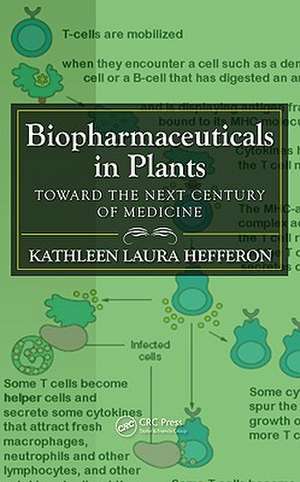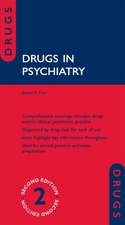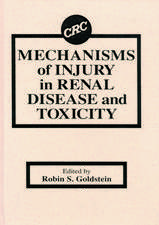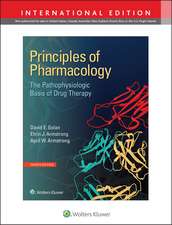Biopharmaceuticals in Plants: Toward the Next Century of Medicine
Autor Kathleen Laura Hefferonen Limba Engleză Hardback – 12 noi 2009
Accompanied by an exhaustive list of references to facilitate further study, this critical volume:
- Describes the theory and practice of modern plant transformation techniques with respect to nuclear and plastic genomes
- Outlines the steps involved in the generation of transgenic plants
- Discusses the engineering of plant virus expression vectors for transient expression of vaccine proteins and other therapeutics in plant tissue
- Addresses the significant role of glycosylation in the production of plant-made mammalian proteins
- Investigates the basis of mucosal immunity using plant-based oral vaccines
- Examines the scale-up of plant-derived vaccine and therapeutic proteins in entire crops or in large batch cell suspension cultures
- Explores the development of clinical trials utilizing plant-derived biopharmaceutical proteins
- Evaluates risks and biosafety concerns regarding plant-derived pharmaceuticals
Preț: 1602.31 lei
Preț vechi: 1686.65 lei
-5% Nou
Puncte Express: 2403
Preț estimativ în valută:
306.59€ • 320.97$ • 253.69£
306.59€ • 320.97$ • 253.69£
Carte tipărită la comandă
Livrare economică 07-21 aprilie
Preluare comenzi: 021 569.72.76
Specificații
ISBN-13: 9781439804742
ISBN-10: 1439804745
Pagini: 204
Ilustrații: 22 b/w images, 4 color images and 20 tables
Dimensiuni: 157 x 236 x 20 mm
Greutate: 0.5 kg
Ediția:1
Editura: CRC Press
Colecția CRC Press
Locul publicării:United States
ISBN-10: 1439804745
Pagini: 204
Ilustrații: 22 b/w images, 4 color images and 20 tables
Dimensiuni: 157 x 236 x 20 mm
Greutate: 0.5 kg
Ediția:1
Editura: CRC Press
Colecția CRC Press
Locul publicării:United States
Public țintă
Botanists, plant scientists, crop scientists, medicinal and natural product chemists, pharmacologists, pharmacognosists, health professionals, and herbalists.Cuprins
History of Plants in Production of Biopharmaceuticals
History of Vaccine Development
History of Vaccine Proteins Produced in Plants
Transformation of Plant Tissue
Agrobacterium tumefaciens-Mediated Plant Transformation
Other Transformation Techniques
Problems Associated with Transformation Techniques
Transformation of Cereals
Hairy Root Transformation
Selectable Marker Genes
Regulation of Transgene Expression
Transgenic Plants Expressing Vaccine and Therapeutic Proteins
Transgenic Plants Expressing Vaccines against Diarrheal Diseases
Animal Vaccines Produced in Plants
The Use of Antibodies in Plants as Immunotherapeutic Agents
Other Biopharmaceuticals and Therapeutic Agents Produced in Plants
Enhancement of Plants for Nutritional or Medicinal Purposes (Nutriceuticals)
Chloroplast Engineering and Production of Biopharmaceuticals
Differences between Nuclear and Plastid Transformations
Plastid Transformation
History of Plastid Transformation and Biotechnological Applications
Vaccines and Therapeutic Proteins Produced in Chloroplasts
Plant Viral Expression Vectors and Production of Biopharmaceuticals in Plants
Plant RNA and DNA Virus Expression Systems
Glycosylation of Therapeutic Proteins in Plants
N-Glycosylation
Differences in N-Glycosylation Patterns between Plants and Mammals
Plant-Made Pharmaceuticals and Plant Allergens
Strategies to Humanize Recombinant Proteins in Plants
O-Glycosylation
Sialic Acid in Plants
Glycosylation of Immunoglobulins Produced in Plants
Other Therapeutic Proteins
Scale-Up of Plant-Derived Biopharmaceuticals: Prospects for Commercial Production and for Global Health
Plant-Made Biopharmaceuticals on the Market
Scale-Up and Production of Biopharmaceuticals in Plants
Application of Virus Expression Vectors for Large-Scale Field Trials
Production of Biopharmaceuticals in Plant Suspension Cells
Comparison of Cell Culture over Whole Plants for Biopharmaceutical Production
Other Expression Systems for Large-Scale Production of Biopharmaceuticals
Downstream Processing of Plant-Derived Biopharmaceuticals
Driving Forces behind Plant-Made Biopharmaceuticals: The General Market Environment
The Immune Response to Plant-Derived Pharmaceuticals
The Immune System in General
T Cells
B Cells
Antibodies and the Immune Response
The Concept of Vaccination and Immune Imprinting
Organization of the Mucosal Immune System
Secretory IgA and the Mucosal Epithelium
Mucosal Immune Response of the Respiratory Tract
Oral Tolerance
Preclinical and Clinical Trials Involving Plant-Derived Vaccines
Diarrheal Diseases
Hepatitis B Virus (HBV)
Rabies Virus
Human Papillomavirus (HPV)
Anthrax
Severe Acute Respiratory Syndrome (SARS)
Measles Virus
Influenza Virus
Swine-Transmissible Gastroenteritis Virus
Canine Parvovirus
Oral Tolerance to Antigens
Risk Analysis and Safety of Plant-Made Biopharmaceuticals
Risk Analysis and Plant-Based Biopharmaceuticals
Regulation of Plant-Made Biopharmaceuticals
Quality Control and the Manufacturing of the Product
Impact of Plant-Made Biopharmaceuticals on Human Health
Impact of Plant-Made Biopharmaceuticals on the Environment
Avoiding Transgene Silencing
Epilogue: The Future
The Current State of Plant-Made Biopharmaceuticals
Index
History of Vaccine Development
History of Vaccine Proteins Produced in Plants
Transformation of Plant Tissue
Agrobacterium tumefaciens-Mediated Plant Transformation
Other Transformation Techniques
Problems Associated with Transformation Techniques
Transformation of Cereals
Hairy Root Transformation
Selectable Marker Genes
Regulation of Transgene Expression
Transgenic Plants Expressing Vaccine and Therapeutic Proteins
Transgenic Plants Expressing Vaccines against Diarrheal Diseases
Animal Vaccines Produced in Plants
The Use of Antibodies in Plants as Immunotherapeutic Agents
Other Biopharmaceuticals and Therapeutic Agents Produced in Plants
Enhancement of Plants for Nutritional or Medicinal Purposes (Nutriceuticals)
Chloroplast Engineering and Production of Biopharmaceuticals
Differences between Nuclear and Plastid Transformations
Plastid Transformation
History of Plastid Transformation and Biotechnological Applications
Vaccines and Therapeutic Proteins Produced in Chloroplasts
Plant Viral Expression Vectors and Production of Biopharmaceuticals in Plants
Plant RNA and DNA Virus Expression Systems
Glycosylation of Therapeutic Proteins in Plants
N-Glycosylation
Differences in N-Glycosylation Patterns between Plants and Mammals
Plant-Made Pharmaceuticals and Plant Allergens
Strategies to Humanize Recombinant Proteins in Plants
O-Glycosylation
Sialic Acid in Plants
Glycosylation of Immunoglobulins Produced in Plants
Other Therapeutic Proteins
Scale-Up of Plant-Derived Biopharmaceuticals: Prospects for Commercial Production and for Global Health
Plant-Made Biopharmaceuticals on the Market
Scale-Up and Production of Biopharmaceuticals in Plants
Application of Virus Expression Vectors for Large-Scale Field Trials
Production of Biopharmaceuticals in Plant Suspension Cells
Comparison of Cell Culture over Whole Plants for Biopharmaceutical Production
Other Expression Systems for Large-Scale Production of Biopharmaceuticals
Downstream Processing of Plant-Derived Biopharmaceuticals
Driving Forces behind Plant-Made Biopharmaceuticals: The General Market Environment
The Immune Response to Plant-Derived Pharmaceuticals
The Immune System in General
T Cells
B Cells
Antibodies and the Immune Response
The Concept of Vaccination and Immune Imprinting
Organization of the Mucosal Immune System
Secretory IgA and the Mucosal Epithelium
Mucosal Immune Response of the Respiratory Tract
Oral Tolerance
Preclinical and Clinical Trials Involving Plant-Derived Vaccines
Diarrheal Diseases
Hepatitis B Virus (HBV)
Rabies Virus
Human Papillomavirus (HPV)
Anthrax
Severe Acute Respiratory Syndrome (SARS)
Measles Virus
Influenza Virus
Swine-Transmissible Gastroenteritis Virus
Canine Parvovirus
Oral Tolerance to Antigens
Risk Analysis and Safety of Plant-Made Biopharmaceuticals
Risk Analysis and Plant-Based Biopharmaceuticals
Regulation of Plant-Made Biopharmaceuticals
Quality Control and the Manufacturing of the Product
Impact of Plant-Made Biopharmaceuticals on Human Health
Impact of Plant-Made Biopharmaceuticals on the Environment
Avoiding Transgene Silencing
Epilogue: The Future
The Current State of Plant-Made Biopharmaceuticals
Index
Recenzii
"This book serves as an excellent introduction to biopharmaceuticals and as a source of references for those wanting more details."
—Monique S.]. Simmonds, in The Journal of Experimental Agriculture, 2011, volume 47 (I)
"Today, molecular farming represents an extremely heterogeneous field, due to the large variety of different production hosts examined and further complications derived from the different cultivation systems employed. ...the book provides a comprehensive overview of the different approaches taken over the last 20 years since the first heterologous expression of a monoclonal antibody in tobacco."
—Dr. Stefan Jennewein, Fraunhofer Institute for Molecular Biology and Applied Ecology, in ChemMedChem, 2010.
—Monique S.]. Simmonds, in The Journal of Experimental Agriculture, 2011, volume 47 (I)
"Today, molecular farming represents an extremely heterogeneous field, due to the large variety of different production hosts examined and further complications derived from the different cultivation systems employed. ...the book provides a comprehensive overview of the different approaches taken over the last 20 years since the first heterologous expression of a monoclonal antibody in tobacco."
—Dr. Stefan Jennewein, Fraunhofer Institute for Molecular Biology and Applied Ecology, in ChemMedChem, 2010.
Notă biografică
Kathleen Laura Hefferon achieved her Ph.D. at the University of Toronto. She most recently held the title of Director of Operations of the Human Metabolic Research Unit in the Division of Nutritional Sciences at Cornell University. She also acts as a science writer for the Center for Hepatitis C Research at Rockefeller University in New York City and as an expert selector for the Infection and Immunity Division of the Medical Research Council, in London.








